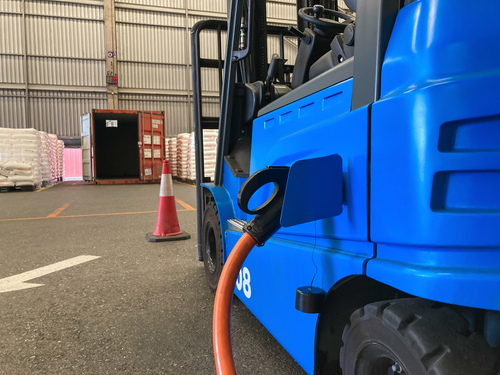
Li-Ion batteries (Li-Ion) for forklifts and walkie stackers
We have all observed a large move towards Li-Ion batteries in mobile materials handling equipment across most industries over the past few years. Li-Ion batteries have advantages over nickel-cadmium or lead-acid which are still in use. Such advantages include shorter charge time, charge is held for longer periods and there is a high power to weight ratio.
Forklift Battery Management Systems (BMS)
With new technology comes the need for training. Therefore, an understanding of Li-Ion battery operating requirements in forklifts is essential for efficiency and safety.
The BMS controls the battery’s activity, including charging and discharging, and monitors the battery’s health and temperature. It also logs data and communicates with the forklift to provide information about the battery’s status.
It is also alerts the operator if the battery is low as well as automatically shut down the truck in a safe way if there are problems. In this way, battery life is extended as it is protected from operational issues. More flexible charging is achieved, as lithium-ion batteries are not affected by how often they are charged.
Lithium-ion batteries are maintenance-free, unlike lead-acid batteries, which require regular maintenance and water level checks.
What can go wrong with Li-Ion batteries
Since Li-Ion batteries usually use a electrolyte liquid solution as the basis to create lithium ions necessary for charging. This means more power stored in a smaller space however this liquid is quite volatile and can create a situation where there is a risk of explosion or fire. The risk increases in high temperature conditions.
Li-Ion batteries produce heat and if this goes un-controlled, fire may result which is difficult to control due its self sustaining nature. This is called thermal runaway.
Overheating or damage to the battery may result from over charging, a faulty charger or a short circuit in the battery. An additional risk includes electrolyte leaking due to damage to the battery.
What of the future?
Currently there is research to develop Li-Ion batteries using a solid type of electrolyte rather than liquid. It is expected that this type will operate over a wider temperature range, be less flammable, have higher output and be less volatile overall.
Training
Onsite Forklift Licencing promote safety when is comes to operating forklifts and walkie stacker and believe up to date training is essential to help maintain a safe workplace. To help maintain an awareness of safety when it comes to Li-Ion batteries, we recommend this free course offered by the University of New South Wales called Free Battery Safety Short Course presented by Dr Matthew Priestly. https://www.dgfi.unsw.edu.au/just-launched-free-battery-safety-short-course-online-self-paced .
How we can help
Click the button below to visit our website for more information about how we can help you maintain a safer workplace through professional forklift and walkie stacker training or call now on 0422 086 968.
Gil Deane